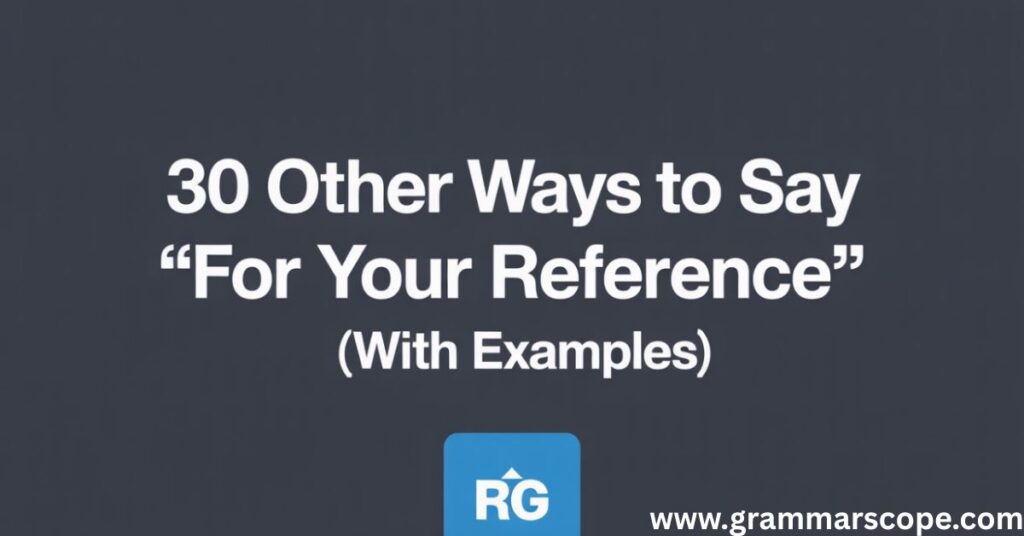For your reference, is a formal phrase often used in professional emails to direct someone’s attention to a document, link, file, or piece of information that may be useful to them. It’s a polite way to say, “Here’s something that may help or inform you,” without implying that they must act on it.
But here’s the deal: overusing “for your reference” can make your emails sound robotic or overly formal, especially if you send lots of internal updates or client communications. That’s why knowing some alternative phrases can seriously enhance your communication and help you build a more natural, personalized tone in your messages.
What to say instead of “For Your Reference”
For Your Guidance
For Your Information
Just So You Know
As a Reminder
For Your Awareness
As a Point of Reference
In Case It’s Helpful
For Your Consideration
For Your Convenience
As a Courtesy
For Your Records
For Your Knowledge
Just to Inform You
In Case You Need It
For Your Understanding
To Keep You Informed
As a Quick Reference
For Your Review
For Your Attention
Just a Heads Up
Please Be Advised
For Clarity
To Provide Insight
For Future Reference
To Help You Out
As an Update
For Your Benefit
For Your Verification
To Assist You
In Your Interest
Why You Might Need Alternatives
For your reference has become a staple phrase in business communication—but there’s a catch. When it pops up too often, it starts to feel like filler. If you’re aiming to sound thoughtful, polished, and more engaging, it’s time to explore other ways to convey the same idea without sounding like an automated response.
Using nuanced expressions in your writing and email correspondence can help you maintain a professional tone while still connecting with your recipient’s time and attention in a respectful, human way. Whether you’re writing to a colleague, a client, or a partner, switching up your wording can bring clarity and variety to your message.
This article offers 30 well-crafted examples for your reference, complete with real-life email examples, so you’re not left guessing how to use them. Ready to upgrade your communication toolbox?
Is It Professional or Polite to Say “For Your Reference”?
Yes, it’s professional—and generally polite—to say “for your reference” in most formal or semi-formal contexts. However, the phrase can sometimes feel distant or impersonal, especially in repeated exchanges. That’s where personalizing communication makes all the difference. You want to sound helpful, not cold.
If your goal is to improve message clarity and demonstrate respect for the recipient’s time, it’s smart to incorporate alternative phrases that maintain the communication tone but feel more tailored to the situation.
Advantages and Disadvantages of Using Alternatives to “For Your Reference”
Advantages:
- Makes your writing feel more human and less robotic
- Strengthens thoughtful communication
- Prevents redundancy in long email threads
- Increases the chance of the reader actually noticing the shared info
Disadvantages:
- Some alternatives may sound too casual in formal settings
- Misusing a phrase could confuse the reader if it lacks contextual clarity
Full List of 30 Alternatives to “For Your Reference” (With Examples)
Each of these for your reference alternatives is followed by a practical scenario—usually in the form of an email snippet—so you can see exactly how to use it.
1. For Your Information

Example (Email):
Hi Rachel,
I’ve attached the revised proposal for your information before tomorrow’s client meeting.
2. Just So You Know
Example:
Hey Jordan,
Just so you know, the pricing model has been adjusted as per the feedback we received.
3. As a Reminder
Example:
Hi Samantha,
As a reminder, our onboarding checklist is available in the shared drive.
4. For Your Awareness
Example:
Hi Dr. Lee,
Please see the attached compliance report for your awareness.
5. As a Point of Reference
Example:
Hi Alex,
I’ve included the Q1 data as a point of reference when reviewing the current forecast.
6. In Case It’s Helpful

Example:
Hi Nina,
In case it’s helpful, here’s a list of all approved vendors for the quarter.
7. For Your Consideration
Example:
Dear Mr. Thompson,
For your consideration, I’ve outlined an alternative workflow that may reduce turnaround time.
8. For Your Convenience
Example:
Hi James,
I’ve attached the summarized notes for your convenience.
9. As a Courtesy
Example:
Hi Lydia,
As a courtesy, I wanted to inform you about the upcoming policy change before the official memo goes out.
10. For Your Records
Example:
Hi Ethan,
I’m forwarding the signed agreement for your records.
11. For Your Knowledge
Example:
Hi Maria,
Just wanted to share the finalized designs for your knowledge—no action needed.
12. Just to Inform You

Example:
Hi Thomas,
Just to inform you, the contract has been successfully renewed through next June.
13. In Case You Need It
Example:
Hey Olivia,
I’ve uploaded the logo pack in case you need it for the presentation.
14. For Your Understanding
Example:
Hi Isaac,
This flowchart may help with your understanding of the new onboarding process.
15. To Keep You Informed
Example:
Hi Brenda,
Sharing the latest bug tracker link to keep you informed.
16. As a Quick Reference

Example:
Hi Dan,
Here’s a table showing all updated SKUs as a quick reference.
17. For Your Review
Example:
Hi Priya,
Attached is the first draft of the proposal for your review
18. For Your Attention
Example:
Dear Greg,
This issue requires escalation for your attention before EOD.
19. Just a Heads Up
Example:
Hey Matt,
Just a heads up—tomorrow’s team meeting is moved to 4 PM.
20. Please Be Advised

Example:
Hi Carol,
Please be advised that your access to the shared portal will expire on Friday.
21. For Clarity
Example:
Hi Rina,
Adding the summarized table for clarity regarding our Q2 projections.
22. To Provide Insight
Example:
Hi Mr. Holmes,
This market analysis is included to provide insight into current customer trends.
23. For Future Reference
Example:
Hi Naomi,
Saving the updated protocol for future reference during audits.
24. To Help You Out

Example:
Hi Omar,
Here’s the expense tracker template to help you out with your monthly reports.
25. As an Update
Example:
Hi Sandra,
Sharing the meeting minutes as an update from yesterday’s discussion.
26. For Your Benefit
Example:
Hi Kevin,
I’ve attached the style guide for your benefit while preparing the branding material.
27. For Your Verification
Example:
Hi Leo,
Please review the document for your verification before we proceed.
28. To Assist You
Example:
Hi Aria,
The cheat sheet is attached to assist you in navigating the dashboard.
29. In Your Interest
Example:
Hi Rob,
We’ve included some case studies of interest that might inspire your pitch deck.
30. For Your Guidance

Example:
Hi Emily,
Please find the regulatory checklist attached for your guidance.
Choosing the Right Alternative
The most important paragraph in this article is the list of 30 alternatives. Why? Because this is your toolkit. Don’t just pick the first one—match the phrase with the tone of your email and the relationship with the recipient.
Use formal phrases like “for your records” or “please be advised” when addressing leadership or clients. Switch to casual options like “just a heads up” or “in case you need it” for internal updates or messages between teammates. This is how you master nuanced expressions and elevate your communication tone.
Conclusion
Using alternatives to “for your reference” isn’t about being fancy—it’s about writing in a way that respects your reader’s time, strengthens your message, and builds a real connection. Whether you’re sharing a quick update or attaching critical documents, these 30 alternative phrases allow you to maintain professionalism while also sounding more relatable and clear.
Next time you’re drafting an email or preparing a report, take a few seconds to scan this list. One thoughtful phrase can shift the tone of your entire message—and that’s the power of thoughtful communication.

Emma Olivia is an experienced blogger and the creative mind behind Grammar Scope. With a passion for language and years of writing expertise, she crafts engaging, informative content that simplifies grammar and writing tips for readers worldwide. Emma’s dedication to clear communication and love for the written word shine through every article she publishes, making Grammar Scope a trusted resource for language enthusiasts and learners alike.







